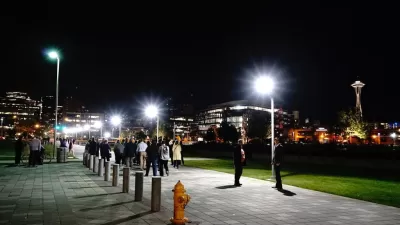In theory, cities might be able to revitalize their economies and infrastructure. But in reality, state governments can create all kinds of obstacles to city policy.
I just finished reading a new book by Bruce Katz and Jennifer Bradley, The Metropolitan Revolution. This book discusses a wide variety of municipal policies designed to spur economic innovation (as well as economic development initiatives by private foundations and other nonprofits).
Katz and Bradley seem to have done their homework, and their book may be valuable to planners and philanthropists looking for ideas. Having said that, their book strikes me as slightly too optimistic. The book's web page states that cities "are reshaping our economy and fixing our broken political system." And where governors and state legislators get out of the way, this description might turn out to be accurate.* But in fact, there is a lot that states can do to sabotage this "revolution."
Because states are in control of state highways and transportation departments, they can limit cities' potential by following the sprawl-oriented policies of in the 1950s. For example, Texas is building Houston's third beltway in order to spur development 25 miles from downtown Houston, and Indiana and Kentucky have agreed to build two new bridges through downtown Louisville, thus making it easier to commute from Indiana to Louisville. The highways of the 1950s opened suburbia for development, thus redistributing people from city to suburb and reducing urban tax bases. I see no reason why similar policies will be any more beneficial in this century. Unfortunately, state politicians have a strong incentive to smash roads through downtowns, because road-builders(unlike transit authorities) give money to campaigns.
States can more directly wage war against municipal tax bases by dictating which taxes a municipality can impose. One particularly common tactic is to cap muncipal property taxes; such "reforms" are popular not only among conservatives, but also among Democrats such as New York's Gov. Cuomo (who persuaded the New York legislature to enact a property tax cap). Such tax caps limit municipal flexiblity to improve public services or adjust to economic change. So why are they popular? Because if a governor limits municipal taxes, he or she may get the best of both worlds politically: credit for cutting taxes, without blame for cutting services. If services are cut, voters will blame the city councillors who voted for the cuts rather than the governor who foreclosed alternatives to the cuts.
Where the state and major cities are controlled by different political parties, governments may limit cities' options for political reasons: for example, in North Carolina, the State Senate voted to take control of Charlotte's airport away from the city of Charlotte, in order to give Republican-leaning suburban counties more power.
And of course, states may also impose costly liabilities upon cities. New York's Taylor Law forces municipalities to arbitrate differences with some municipal unions, thus increasing labor costs. Even without state interference, city governments might be too broke to innovate very much, because many cities decided to raise city workers' pensions in the past, leading to huge pension liabilities now that the population is aging and the retiree population is increasing.
In sum, municipal governments may be planning on a "revolution"- but without state cooperation, they will be lucky to avoid bankruptcy.
*Assuming that the policies discussed in the book are (1) worth pursuing and (2) important enough to make a significant difference in their cities' economic future. I leave this issue for another day.

Maui's Vacation Rental Debate Turns Ugly
Verbal attacks, misinformation campaigns and fistfights plague a high-stakes debate to convert thousands of vacation rentals into long-term housing.

Planetizen Federal Action Tracker
A weekly monitor of how Trump’s orders and actions are impacting planners and planning in America.

In Urban Planning, AI Prompting Could be the New Design Thinking
Creativity has long been key to great urban design. What if we see AI as our new creative partner?

King County Supportive Housing Program Offers Hope for Unhoused Residents
The county is taking a ‘Housing First’ approach that prioritizes getting people into housing, then offering wraparound supportive services.

Researchers Use AI to Get Clearer Picture of US Housing
Analysts are using artificial intelligence to supercharge their research by allowing them to comb through data faster. Though these AI tools can be error prone, they save time and housing researchers are optimistic about the future.

Making Shared Micromobility More Inclusive
Cities and shared mobility system operators can do more to include people with disabilities in planning and operations, per a new report.
Urban Design for Planners 1: Software Tools
This six-course series explores essential urban design concepts using open source software and equips planners with the tools they need to participate fully in the urban design process.
Planning for Universal Design
Learn the tools for implementing Universal Design in planning regulations.
planning NEXT
Appalachian Highlands Housing Partners
Mpact (founded as Rail~Volution)
City of Camden Redevelopment Agency
City of Astoria
City of Portland
City of Laramie





























